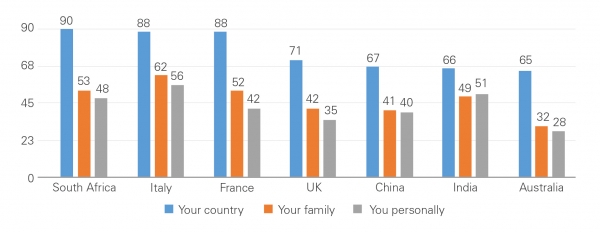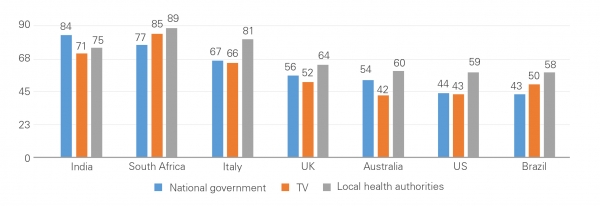COVID-19: an opportunity for cultivating a positive public relationship with science in South Africa
The world faces accelerated change and uncertainty as countries try to deal with the COVID-19 pandemic. South Africa also has to contend with high levels of inequality, poverty and unemployment. Decision makers rely on science and technology-based evidence to develop policy and solutions to these challenges. Similarly, the public increasingly relies on valid scientific information to support their daily lives. Cultivating a positive relationship with science is crucial for, and contingent on, a trusting, scientifically literate and critically engaged public. Sylvia Hannan, Saahier Parker and Vijay Reddy present some key findings from local and international COVID-19 surveys that highlight the importance of understanding and addressing the public’s relationship with science.
The COVID-19 pandemic has had a devastating global impact, with severe and long-term social, economic and health consequences. Gaining a deeper understanding of the public’s response is critical to achieve a broad public-health impact. COVID-19 has highlighted globally, and in South Africa, how public-health information can yield a pervasive message in multiple formats, communication modalities and languages. The public was able to assimilate evidence-based information towards social and behavioural change, highlighting the importance of a positive relationship between the public and science.
A positive relationship must be encouraged through greater engagement between the public and the scientific community. These engagements should aim to facilitate mutual understanding, information sharing and public participation. Research into the public-science relationship creates space for evidence-based dialogue, bringing the public to the fore of science policy and intervention planning.
The public and COVID-19
Various surveys have been conducted to provide information on public attitudes, behaviour and experiences amid the pandemic. We present some key findings from surveys conducted in March and April 2020 in South Africa with comparisons to other countries to highlight the importance of understanding and addressing the public’s relationship with science. At the time of writing, these were the most recent comparable data.
Figure 1: Percentage of respondents perceiving a threat of coronavirus to their country, their family and themselves (%)
According to an Ipsos poll conducted late in March 2020, South Africans had one of the higher levels of concern regarding the threat of the virus to their country, their family and themselves (Figure 1). Similar to other nations, they were most concerned about the threat to their country. This may signal that individuals felt that the personal threat was not as great as it may have been for others, or that the wider economic threat was greater than the individual threat. These data reflect opinions in the first few days after the announcement of a lockdown in South Africa.
Since March, the HSRC has also been conducting surveys on the progression of the epidemic from a sociobehavioural vantage. An initial survey found that among 55 000 South Africans, the majority (58%) reported a Moderate to Very High personal risk perception during the early days of the lockdown. Similar to the Ipsos survey findings, the highest proportion (66%) felt that South Africa as a country had a higher risk outlook than the aforementioned level of personal risk.
Figure 2: Trust in information sources
Public trust in sources of information is critical to understanding the best channels for communication. According to the Ipsos poll, respondents in all countries except India showed the highest level of trust in their local health authorities (Figure 2). In South Africa, trust in TV and the national government was also relatively high. The way in which information is communicated, the accuracy of the information shared, and the impact of decisions made all affect the level of public trust.
The HSRC survey found that South Africans reported significantly higher access to internet-based media sources (40%) and traditional media access, while reported access to information from government (16%) and health authorities (6%) was very low. The public may have had further access to information from the government and from health authorities through the media. During the early days of lockdown, the government (93%) and health authorities (95%) were the most trusted sources of information among the 55 000 respondents, particularly in relation to COVID-19.
Cultivating a positive relationship with science
The COVID-19 pandemic has highlighted the importance of cultivating a positive relationship between the public and science. Public engagement will be critical in addressing this crisis and contributing to the country’s long-term social and economic recovery. The modes of information creation, dissemination and application now occur within a different social context. Understanding the antecedents of these processes becomes increasingly important. Beyond this, a population interested in, while similarly critical of scientific developments, policy and social influence, remains the primary objective. The public relationship with science, together with public sentiment in response to changing contexts, remains the key feature of a society best able to demonstrate resilience and objectivity, particularly in times of significant emergency and disruption.
Where to next?
Public engagement with science is crucial for a trusting, scientifically literate and critically engaged public. The HSRC has had a longstanding relationship with the Department of Science and Innovation (DSI) on research associated with the public relationship with science. The DSI’s Science Engagement Strategy highlighted the importance of public engagement with science and technology, and the 2019 White Paper on Science, Technology and Innovation recommended the establishment of a long-term monitoring and evaluation (M&E) programme of system-wide science engagement and an institutionalised survey on public perceptions of science.
The HSRC in collaboration with DSI has developed a Science Engagement M&E Indicator Framework and published a report, Science and the Publics: Mapping Public Relationship with Science Surveys, which explored empirical, theoretical and policy formulations directing science engagement in South Africa, and around the globe.
Authors: Sylvia Hannan, a senior researcher, and Dr Vijay Reddy, a distinguished research specialist in the HSRC’s Inclusive Economic Development division; and Dr Saahier Parker, a senior research manager in the HSRC’s Impact Centre.
shannan@hsrc.ac.za
vreddy@hsrc.ac.za
sparker@hsrc.ac.za


